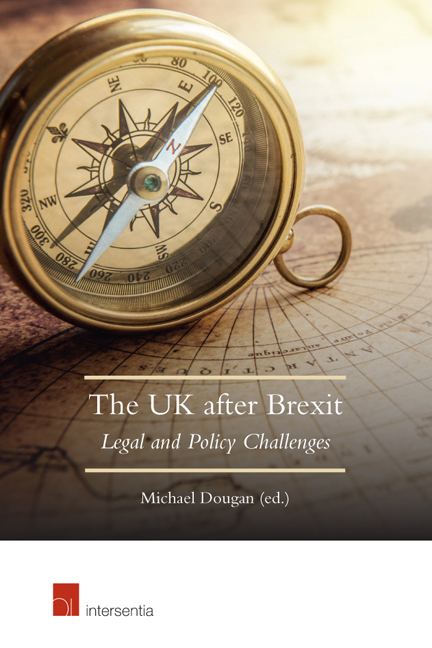Book contents
- Frontmatter
- Contents
- List of Authors
- Editor's Introduction
- Part I Constitutional Issues
- Part II Substantive Policies
- Chapter 5 Brexit and Employment Law
- Chapter 6 UK Environmental Law Post-Brexit
- Chapter 7 Extracting the UK from EU Financial Services Governance: Regulatory Recasting or Shadowing from a Distance?
- Chapter 8 Intellectual Property Law and Brexit: A Retreat or a Reaffirmation of Jurisdiction?
- Chapter 9 May We Stay? Assessing the Security of Residence for EU Citizens Living in the UK
- Chapter 10 Cross-Border Criminal Cooperation aft er Brexit
- Part III External Relations
- About the Editor
Chapter 9 - May We Stay? Assessing the Security of Residence for EU Citizens Living in the UK
from Part II - Substantive Policies
Published online by Cambridge University Press: 13 October 2018
- Frontmatter
- Contents
- List of Authors
- Editor's Introduction
- Part I Constitutional Issues
- Part II Substantive Policies
- Chapter 5 Brexit and Employment Law
- Chapter 6 UK Environmental Law Post-Brexit
- Chapter 7 Extracting the UK from EU Financial Services Governance: Regulatory Recasting or Shadowing from a Distance?
- Chapter 8 Intellectual Property Law and Brexit: A Retreat or a Reaffirmation of Jurisdiction?
- Chapter 9 May We Stay? Assessing the Security of Residence for EU Citizens Living in the UK
- Chapter 10 Cross-Border Criminal Cooperation aft er Brexit
- Part III External Relations
- About the Editor
Summary
INTRODUCTION
The seismic effects of the British electorate's decision to leave the European Union will be felt in almost every corner of the UK's political and legal landscape over the short, medium and longer term. On the day of the referendum result, however, one question arose immediately: would currently resident nonnational EU citizens – most of whom did not themselves have a say in the outcome of the referendum – be able to remain in the UK? Despite assurances from the UK Government that it wanted to secure residence rights for such EU citizens when it formally notified the European Council of UK withdrawal, concrete commitments were yet to be made. Consequently, EU citizens were left, somewhat blindly, seeking means of pre-emptively securing their residence in the UK in the absence of any indication from Government as to the correct path to follow. The UK Prime Minister consistently asserted that the Government's hands were tied, arguing that it needed to ensure reciprocal protection for UK citizens living in the remaining Member States and claiming that ‘one or two’ EU leaders refused to reach early agreement on the issue, ahead of the commencement of formal negotiations.
The Government's delay in responding to the question of EU citizens ‘ residence rights and its preoccupation with reciprocity has already led to ‘a great deal of anxiety and uncertainty’ amongst the UK's resident EU population about their security of residence. The Government's stance has also increased the urgency of the residence question, with both substantive and procedural consequences for any agreement reached. First, a deal is now likely to focus on the immediate question of whether and how currently resident EU citizens can stay in the UK, with reduced time and space to consider equally pertinent longer-term residence issues. Second, the emphasis on reciprocity further limits the opportunity for a legally binding outcome, while any political agreement will still need to be translated into legal reality.
- Type
- Chapter
- Information
- The UK after BrexitLegal and Policy Challenges, pp. 181 - 202Publisher: IntersentiaPrint publication year: 2017

